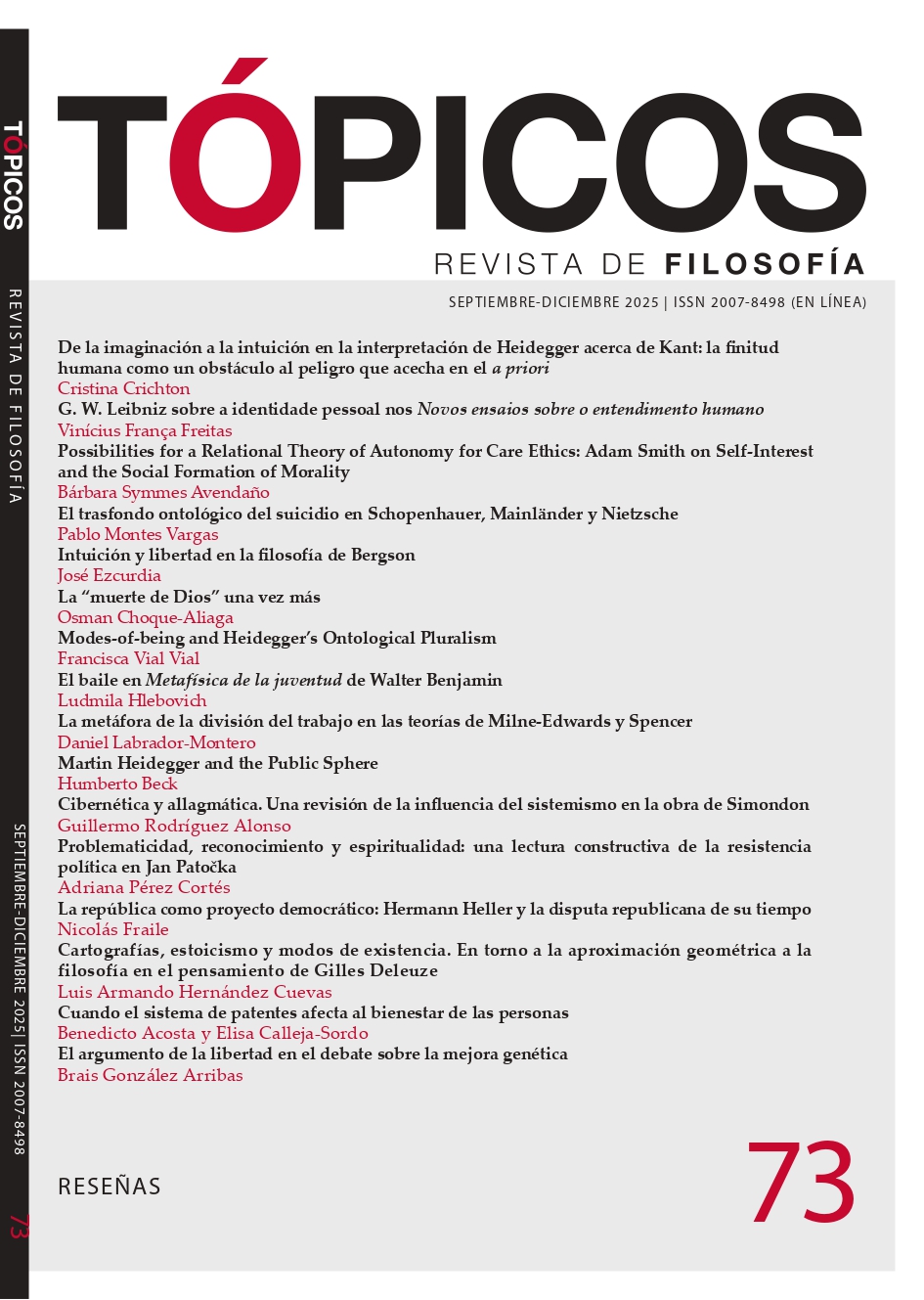Problematicity, Recognition and Spirituality: A Constructive Reading of Political Resistance in Jan Patočka
Published 2025-08-25
Keywords
- problematicity,
- sacrifice,
- political resistence,
- political pluralism,
- freedom
- social dynamics,
- ethics,
- intersubjectivity,
- political commitment,
- Jan Patočka ...More
Copyright (c) 2025 Tópicos, Revista de Filosofía

This work is licensed under a Creative Commons Attribution-NonCommercial-NoDerivatives 4.0 International License.
How to Cite
Abstract
This article discusses whether it is possible to speak in a positive sense of political resistance in Patočka, considering that in his reflections there is a clear tension regarding the power dynamics that are usually imposed to avoid it. To do this, I analyze the three movements of existence proposed by Patočka to emphasize in what sense political action can only occur in the third movement because it promotes a non-instrumental intersubjective relationship. This allows us to recognize our finitude and vulnerability and make ourselves ethically responsible for a type of non-traditional political resistance, whose interest is not to intervene in new forms of domain of life. There is, rather, a commitment to a political pluralism that does not reduce the different horizons of meaning of individuals through an effective struggle for power, but rather assumes, through the image of the spiritual man, an attitude of conversion that includes the freedom to constitute one’s own existence as a political project and, through it, a transformation of our social dynamics.
Downloads
References
- Butler, J. (2020). La fuerza de la no violencia. La ética en lo político. M. Mayer (trad.). Paidós.
- Chvatík, I. (2003). The Responsibility of the “Shaken”: Jan Patočka and his “Care for the Soul” in the “Post-European” World. En J. Dodd (ed.), Jan Patočka and the Heritage of Phenomenology: Centenary Papers (pp. 129-144). Kluwer.
- De Warren, N. (2013). Patočka’s Concept of the World. Studia Phaenomenologica, 13(1), 241-263.
- Foucault, M. (2003). Hay que defender la sociedad. Curso del Collège de France (1975-1976). H. Pons (trad.). Akal.
- Girardi, L. (2020). From Care for the Soul to the Theory of the State in Jan Patočka. International Journal of Philosophy and Theology, 81(3), 196-210. https://doi.org/10.1080/21692327.2020.1716832
- Homolka, J. (2017). Jan Patočka’s Non-Political Politics. Acta Universitatis Carolinae, 7(1), 130-146. https://doi.org/10.14712/24646504.2018.10
- Mensch, J. (2016). Patocka’s Asubjective Phenomenology: Toward a New Concept of Human Rights. Königshausen & Neumann.
- Moody-Adams, M. (2022). Making Space for Justice: Social Movements, Collective Imagination, and Political Hope. Columbia University Press. https://doi.org/10.7312/mood20136
- Patočka, J. (1998). Ensayos heréticos sobre filosofía de la historia. A. Ciavarella (trad.). Península.
- Patočka, J. (2007). Libertad y sacrificio. I. Ortega Rodríguez (trad.). Sígueme.
- Patočka, J. (2016). The Natural World as a Philosophical Problem. E. Abrams (trad.). Northwestern University Press. https://doi.org/10.2307/j.ctv43vtwd
- Patočka, J. (2019). Lecciones XVII-XX: Cuerpo, comunidad, lenguaje, mundo. I. Ortega Rodríguez (trad.). Aporía. Revista Internacional de Investigaciones Filosóficas, 3(especial), 18-47. https://doi.org/10.7764/aporia.3-Especial.1929
- Pommier, E. (2018). Un nuevo mundo: ética del sacrificio y fenomenología asubjetiva. Jan Patočka. Revista de Filosofía Aurora, 30(50), 486-502. https://doi.org/10.7213/1980-5934.30.050.AO07
- Ricoeur, P. (2007). Jan Patočka: un filósofo de la resistencia. En P. Ricoeur, Escritos y conferencias (pp. 145-157). Trotta.
- Scott, J. C. (1985). Weapons of the Weak: Everyday Forms of Peasant Resistance. Yale University Press.
- Tilly, C. (2004). Social Movements, 1768–2004. Paradigm Publishers.





